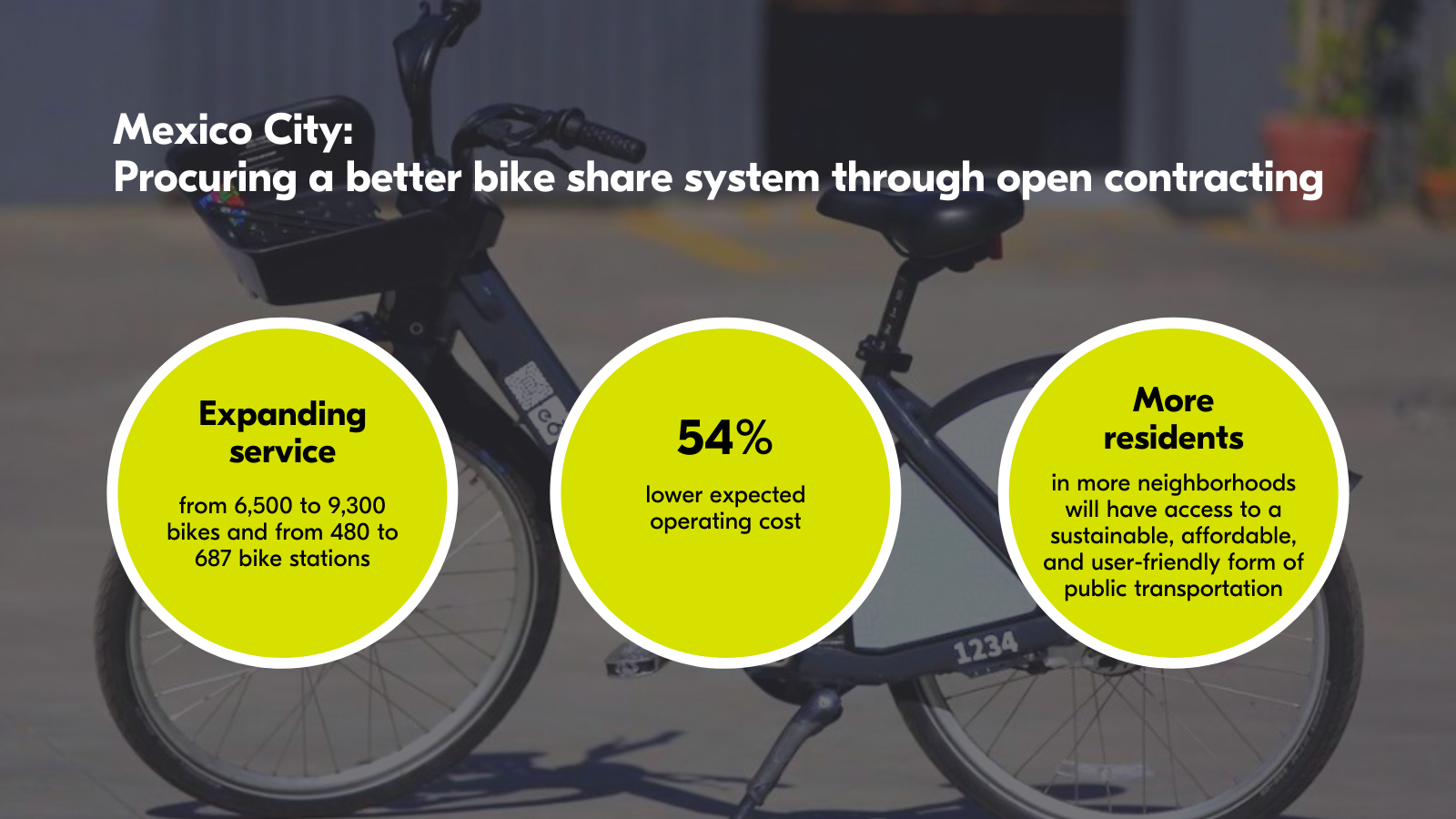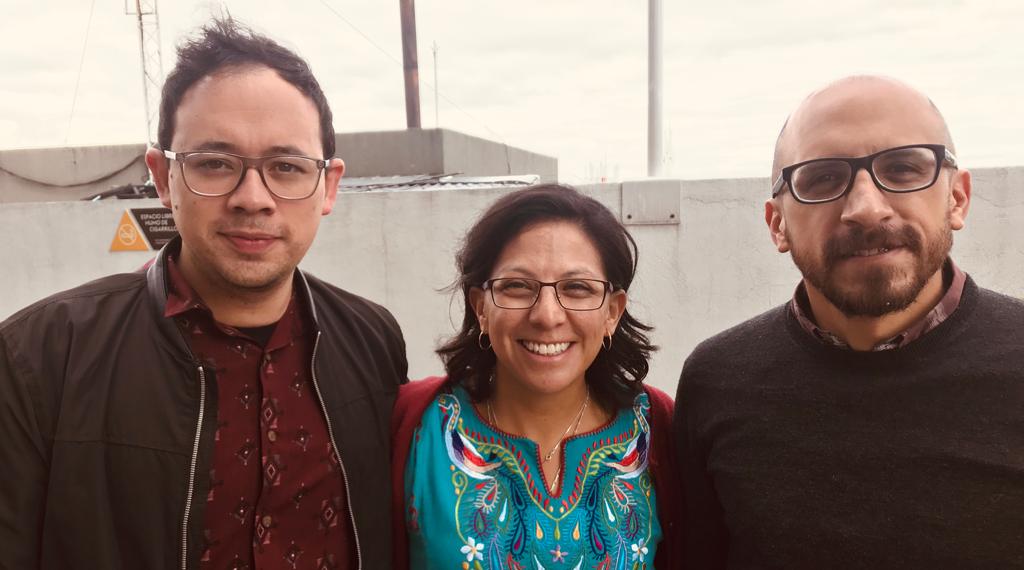Peddling openness: Mexico City’s journey to procure a better bike share system

Summary
- Challenge: After ten years of operation, Mexico City sought to expand their environmentally friendly and affordable bike share service to more neighborhoods, upgrade the design and technology, and all at a reasonable cost. The city needed to promote competition in a concentrated marketplace, learn more about the latest bike share technology and innovations, and provide better and expanded service at the same or lower budget.
- Open contracting approach: Mexico City used open contracting to design a transparent procurement process to procure a modern, expanded, and user-friendly bike share network. The cross-departmental team used new strategies and a strategic communication framework to engage vendors openly from around the world throughout the procurement process and to solicit user feedback.
- Results: The city’s new contract expands the service from 6,500 to 9,300 bikes and from 480 to 687 bike stations, and upgrades the city’s bike share technology and design to be more user-friendly, all at approximately half the operating costs of the old service. Other departments have begun replicating Ecobici’s open contracting strategies for important strategic public projects, and the city also enhanced its electronic procurement system to help others use Ecobici’s approach for engaging vendors, citizens and civil society organizations early in high-priority procurement processes.

Challenge
Mexico City’s leaders have an ambitious vision to overhaul their bike share program, Ecobici. Already the largest bike share system in Latin America, Ecobici has 300,000 users who take 30,000 trips per day. It has become essential for commuters and residents, connecting them to the city’s broader public transportation network. During its first decade of operation, Ecobici helped tackle congestion and pollution, as well as saved the city 5,700 tons of CO2.
Mayor Claudia Sheinbaum Pardo and city leaders from the Secretary of Transport saw an opportunity to build on this success when, after ten years with the same operator, the Ecobici contract came up for renewal. Expanding the program to more neighborhoods and upgrading the Ecobici system to be more user-friendly could help the city tackle urgent challenges around pollution, traffic congestion, and public health.
But the team of city staff faced significant challenges. The world of bike share systems has changed over the past decade. Re-tendering the contract would require making informed decisions about a number of different technical specifications, ranging from better bicycles to new software technologies. The team was asked to deliver this better and expanded service for the same budget. What’s more, given the system’s popularity with residents, heavy scrutiny from the public and civil society, and the significant size and duration of the contract, the team knew they were going to be held accountable for their decision.
Business as usual was not going to be enough for them to get the process right.
Open contracting approach
The Ecobici team turned to open contracting and OCP’s Lift program to back transformational procurement reforms that would increase city engagement and transparency with the community and vendors.
The city published a Request for Information for the first time, sought resident input on the bike share design, held multiple public conversations with vendors, and published the documentation, updates, and findings on a user-friendly website. This enabled the team and the vendor community to make data-driven decisions, build trust, promote competition, and ultimately deliver on their goal of helping more residents in more neighborhoods to access this green and affordable form of public transit.
The new contract expands service from 6,500 to 9,300 bikes and 480 to 687 bike stations, and upgrades the city’s bike share technology and design to be more user-friendly – all at half the operating costs of the old service.
“Ecobici has been transformational for Mexico City. Not only has it catalyzed travel by bicycle, with this second tender Ecobici has enabled innovation in public contracting. Just as the first Ecobici contract marked a before and an after for urban cycling in the city, this new contracting procedure will be a milestone for open and transparent public procurement here,” says María Fernanda Rivera Flores, General Director for Road Safety and Sustainable Urban Mobility Systems, SEMOVI.
“The expansion of the system into new areas will increase the number of non-motorized trips, and with the renovation of the actual infrastructure, many people will choose Ecobici as a mode of transport. This will help Mexico City maintain its commitment to more and better mobility.”
Over two years, OCP worked closely with the government of Mexico City to implement open contracting and procurement best practices. This support was provided through Lift, OCP’s competitive impact accelerator program that helps teams of bold procurement reformers around the world to go further with their ideas and deliver change. Through this program, the city connected with global peers, learned from leading experts on supplier engagement, and received ongoing technical assistance.
Three strategies that contributed to the success of the project so far include:
1. A robust mandate for open contracting and innovation.
From the outset of the process, the city publicly committed to hosting an open and competitive process that rewarded innovation and better service delivery outcomes. In their announcement of the new tendering process, the Mayor and the Secretary of Transport (Secretaría de Movilidad, or SEMOVI) highlighted the need to do things differently. The buy-in from leadership laid the groundwork for everything else to come and helped the team navigate obstacles faced during the tendering process. The team also maximized their combined power: dedicated civil servants from SEMOVI and the city’s Digital Public Innovation Agency (Agencia Digital de Innovación Pública, or ADIP) came together to work jointly on this process. The collaborative group was eager to leverage their institutional directive and experience with public procurement to the project.

This cross-departmental team not only had a mandate, they had a commitment to innovation and were not afraid to try new things, reflect, and learn. The team sought out conversations with experts and other municipalities to understand best practices and risks. They also used new project management approaches from the Lift program to strengthen their ability to plan and pivot. This agility enabled the team to take risks, make smart course corrections along the way, and deal with procedural rules that didn’t allow them to be as open or driven by results (rather than compliance) as they wished.
2. New supplier and community engagement strategies.
The city wanted an open and competitive process to get the best results and value for residents. However, promoting competition and gathering information from this market is very challenging because modern public bike-sharing systems bring together businesses from different industries. For example, one set of companies specializes in the system operations, while others provide technology for software ranging from user apps to geolocation services, and yet other companies support the advertisements that are critical for financing the system. Only few, if any, vendors globally are in a position to provide all of these services.
To overcome these barriers, the team carried out new market research and vendor outreach strategies for the city. These tactics included the city’s first-ever Request for Information process (RFI), which yielded suggestions to improve the service from nine companies with experience operating in 35 cities. The vendors also suggested a revised finance model combining sponsorship and government subsidies – an idea which the city pursued for Ecobici, and contributes to the long term financial viability of the system.
The city was also committed to sharing information with the community and gathering their input. For example, the city organized a virtual “public square” to gather feedback on the draft tender documents from civil society representatives, citizens, and suppliers. In the end, the city received more than 300 comments on important features, ranging from bike and station designs to where the stations would be located.
”Mexico City’s approach created opportunities for suppliers and the public to share new and creative ideas with the city in a way that raised the level of ambition. Throughout, the city maintained high standards of integrity by being upfront about procedures, and offering an opportunity for the public, and suppliers, to provide feedback on the draft Terms of Reference before publication,” noted Sascha Haselmayer, Partner with Ashoka Germany and Fellow at New America.
“The project truly raised the bar on how we can think about a creative relationship with suppliers and the public, without compromising the principles of transparency or fairness.”
To support trust and transparency throughout the planning process, the city created a dedicated project website. This website launched at the start of the team’s work, and became the central hub for sharing information throughout the entire process. The team updated this site on a regular basis with all the information that suppliers or residents might be interested in, including the results from the subsequent RFI and user feedback processes, upcoming and past events, and key project milestones.
3. Commitment to competition and transparency despite barriers.
There were many moments when the team could have been tempted to cut corners in terms of openness to make their lives easier. But the Ecobici team held fast to their vision of a competitive and transparent process. This commitment helped the city achieve good results, particularly during critical moments when the fate of the project was on the line.
So, for example, the team wanted to create selection criteria that would award the contract to the vendor who provides the best value for money. However, Mexico City procurement law states that contracts must be awarded to the lowest bidder. The team had to develop a strong technical annex that would guarantee that the lowest bid would still achieve a high quality service, while providing enough flexibility in the specifications as to enable innovation from the vendors.
The future of the bike share system renewal fell into doubt when the pandemic struck. City budgets were significantly reduced, Ecobici ridership declined, and supply chain challenges meant that vendors faced rising costs. To help navigate this uncertainty, the team issued a second RFI to gather vendor input on whether it was still financially viable to run the system. They also discussed how the crisis might affect tender requirements, and what a revised timeline might look like for vendors to prepare their proposals. The results of this RFI, combined with additional studies to understand the size of Ecobici’s advertisement market, allowed the city to develop a new revenue-sharing model to secure the financial sustainability of the system.
The team’s efforts to carry out an open tendering process also helped guide them through last-minute bureaucratic barriers and ultimately secure lower operating costs. Due to the pandemic, the planning process extended for longer than the city originally anticipated. In the end, the city received bids from two consortiums of two companies each. However, the city was forced to declare the tender void when both bids were disqualified because they didn’t meet all the legal and technical requirements. The team then moved to an Invitation to Bid and invited all companies that participated in the public tender process to submit a bid, but since only the same two consortiums bid and city law requires three bids to award, this too was declared void. So the team carried out a reverse auction between the two companies to directly award the contract, with the aim of mimicking the original open tendering process where all qualified proposals would compete only on price. This successful auction led to a 54% reduction in the planned budget.
Results
The open contracting strategies above helped the Ecobici team create an open and transparent process that achieved the city’s goal of securing a contract for expanded services in more neighborhoods at half the anticipated cost. The team’s approach also led to innovations that further improved the accessibility of the service. One example is that the bikes now have adjustable seats that fit shorter riders, a problem raised during consultations with citizens.

Others within City Hall are already replicating the team’s open contracting strategies to deliver better services for residents, including for tenders such as the city’s public transportation card payment system.
The Ecobici planning process also highlighted how Mexico City procurement practices could do more to encourage competition and achieve better value for money. Mexico City is not alone. Many governments are afraid of the risks involved in acquiring new services or using new methodologies to change the solicitation process, leading to less competition. Often governments, like Mexico City, mandate that vendors must be selected based on lowest cost rather than best value. Similarly, many procurement regulations limit the ability of vendors to correct even formal details of their proposals in the award stage, increasing the odds of disqualifying proposals and the number of failed tendering processes. A strong bid should not fail on minor formalities if they can be corrected transparently and fairly.
Driving better procurement outcomes will require investing in public procurement and building a culture that centers around performance and outcomes. Too often, cities lack the time and resources to research the marketplace. This limits their ability to achieve value for money in their procurement processes. Mexico City had to rely on pro-bono services and limited internal capacity to design its new revenue-sharing model. In the end, these investments created significant savings in the bike share operating costs.
The team’s work with Ecobici is not over. Now that Mexico City has bought their bicycles, it’s time to see how they perform in action. Contract implementation can be like testing out a new bike – it can take some time, tweaks, and practice to achieve the best fit and a smooth ride. That’s why the team’s real success will become visible when citizens can use the new system after it rolls out in 2022.
What’s next for open contracting in Mexico City
Mexico City aims to build on their open contracting progress. To support further replication, the team has launched a Draft Bidding Document Module in the city’s online procurement platform, Tianguis Digital in February. In addition, the city was selected to participate again in Lift, OCP’s impact accelerator program. Under this new engagement, the city seeks to expand their work on vendor engagement to secure more inclusive procurement outcomes for small and medium-sized businesses, particularly those led by women and other minorities.
The Ecobici project showed the path forward for promoting innovation and increasing accountability in Mexico City’s procurement system. All city procurement processes – not just Ecobici – would benefit from having an open and transparent process across the entire procurement cycle. To accomplish this, Mexico City has renewed interest and efforts in disclosing information about its procurement processes according to the Open Contracting Data Standard (OCDS), which would make information at all stages of the contracting process accessible for all interested stakeholders. Although the transition to OCDS has moved slowly so far, the results with Ecobici have boosted momentum.
“In Mexico City, we are transforming the process of public contracting to be more open, transparent, and efficient,” said Fabián López Xochipa, Advisor on Public Procurement Strategies, ADIP. “As these best practices become part of the daily life of procurement public practitioners, we anticipate seeing more digital tools and success stories like Ecobici in the coming months.”
Update 4 February: The story has been updated to mention that the Draft Bidding Document Module has been launched.